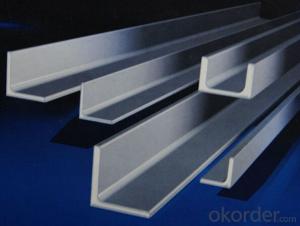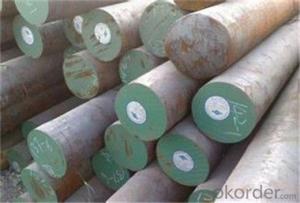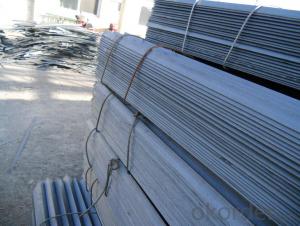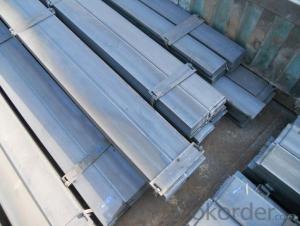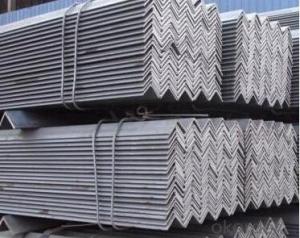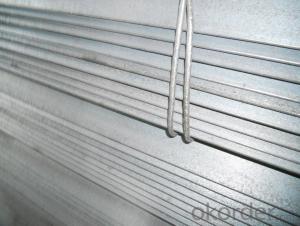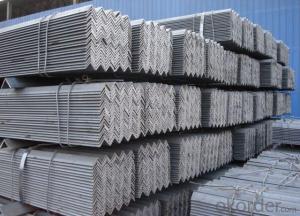Hot Rolled Black Mild Carbon MS Steel Angle Bar
- Loading Port:
- Tianjin
- Payment Terms:
- TT or LC
- Min Order Qty:
- 3 m.t.
- Supply Capability:
- 10000 m.t./month
OKorder Service Pledge
OKorder Financial Service
You Might Also Like
Specification
Hot Rolled Black Mild Carbon MS Steel Angle Bar
Detailed Information
Name | Equal/Unequal Angle Steel Bar |
Shape | Equal/Unequal Angle |
Standard | GB/ASTM/SAE/AISI/DIN/JIS/EN/BS |
Surface Treatment: | Black/Peeling/Polished/Machined |
Delivery Condition: | Hot Rolled or Forged/Peeled or Black Surface |
Test | SGS/UT 100% Elements Testing |
Certificate: | ISO/Mill Certificate |
Service: | 24 hours online service / |
more than 20 years trading and manufacture | |
Quality Assurance: | the third party inspection, such as SGS, BV, TUV…etc. is acceptable |
Packaging Details: | Seaworthy Packaging or as per customer's packing instruction |
Specification
| 75*75 90 degree equal steel angle bar, angle iron steel |
Grade | Q195, Q215, Q235, Q345, SS400, A36, S235JR, ST37,etc |
Standard | AISI, ASTM, BS, DIN, GB, JIS, etc |
Equal Angle | 1)Type: 2#-20# |
2)Size: 20mm-200mm | |
3)Thickness: 3.0mm-18mm | |
Unequal Angle | 1)Type: 2.5/1.6-20/12.5 |
2)Long Side: 25-200mm | |
3)Short Side: 16-125mm | |
4)Thickness: 4.0-18mm | |
Length | 5.8m-12.0m or as your requirement |
Surface | Perforated/galvanized/black |
Inspection | BV,SGS,MTC,etc. |
Technique | Hot rolled |
Company Introduction
CNBM International Corporation is the most import and export platform of CNBM group(China National Building Material Group Corporation) ,which is a state-owned enterprise, ranked in 270th of Fortune Global 500 in 2015.
With its advantages, CNBM International are mainly concentrate on Cement, Glass, Iron and Steel, Ceramics industries and devotes herself for supplying high quality series of refractories as well as technical consultancies and logistics solution.
Packaging & Delivery
Packaging Detail | Sea worthy packing /as per customer's packing instruction |
Delivery Detail | 15 ~ 40 days after receiving the deposit |
Products Show
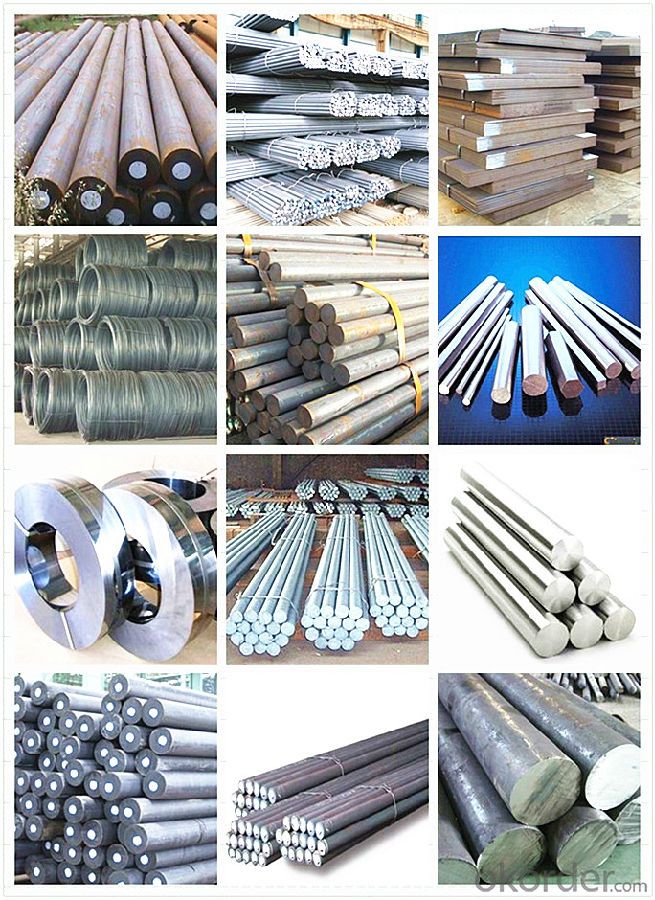
FAQ
Are you a trading company or manufacturer? | Manufacturer |
What’s the MOQ? | 3 metric ton |
What’s your delivery time? | 15-35 days after downpayment received |
Do you Accept OEM service? | Yes |
what’s your delivery terms? | FOB/CFR/CIF |
What's the Payment Terms? | 30% as deposit,70% before shipment by T/T |
Western Union acceptable for small amount. | |
L/C acceptable for large amount. | |
Scrow ,Paybal,Alipay are also ok | |
Why choose us? | Chose happens because of quality, then price, We can give you both. |
Additionally, we can also offer professional products inquiry, products knowledge train (for agents), smooth goods delivery, excellent customer solution proposals. | |
What's your available port of Shipment? | Main Port, China |
What’s your featured services? | Our service formula: good quality+ good price+ good service=customer's trust |
Where are your Market? | Covering more than 160 countries in the world |
- Q: What are the properties of carbon steel?
- Carbon steel is a type of steel that primarily consists of iron and carbon. It is known for its high strength, durability, and relatively low cost compared to other materials. Carbon steel is also highly resistant to corrosion and can withstand high temperatures. It can be easily shaped and welded, making it a versatile material for various applications in industries such as construction, automotive, and manufacturing.
- Q: What are the benefits of using special steel in the energy sector?
- The benefits of using special steel in the energy sector are numerous. Firstly, special steel offers exceptional strength, durability, and resistance to corrosion, making it ideal for withstanding the harsh conditions experienced in energy production and transmission. This allows for longer service life and reduced maintenance costs. Additionally, special steel possesses excellent heat resistance, enabling it to withstand high temperatures and pressure, making it suitable for use in power generation equipment such as turbines and boilers. Furthermore, special steel is highly versatile and can be customized to meet specific requirements, facilitating the design and construction of complex structures and components in the energy sector. Ultimately, the use of special steel enhances the reliability and efficiency of energy systems, contributing to overall sustainability and cost-effectiveness.
- Q: How is special steel used in the construction supply chain?
- Special steel is used in various ways in the construction supply chain. It is commonly used in the production of high-quality tools and equipment used in construction, such as drills, saws, and hammers. Special steel is also utilized in the manufacturing of structural components, such as beams and columns, which provide strength and durability to buildings and infrastructure projects. Additionally, it is used in the production of reinforcing bars and wire mesh, which reinforce concrete structures and ensure their stability. Overall, special steel plays a crucial role in enhancing the performance and safety of construction materials and products in the supply chain.
- Q: How is special steel used in the manufacturing of machinery?
- Special steel is an essential component in the manufacturing of machinery due to its unique properties that make it highly suitable for this purpose. Special steel refers to a category of steel alloys that have been specifically designed and developed to possess exceptional strength, durability, and resistance to wear and tear. In the manufacturing of machinery, special steel is commonly used in various applications. One of the primary uses is in the production of machine components that require high strength and toughness, such as gears, shafts, bearings, and fasteners. These components are subjected to heavy loads, high temperatures, and harsh operating conditions, and therefore, they need to withstand these stresses without failure or deformation. Special steel provides the necessary strength and toughness to ensure the longevity and reliability of these machine parts. Additionally, special steel is also utilized in the manufacturing of cutting tools and dies. Cutting tools, such as drills, milling cutters, and lathe tools, need to have excellent hardness and wear resistance to withstand the forces and abrasion encountered during the machining process. Dies, on the other hand, are used to shape or form materials, and they require high strength and hardness to withstand the repetitive pressure and deformation. Special steel provides the necessary properties to enhance the performance and lifespan of these cutting tools and dies. Furthermore, special steel is often utilized in the construction of machine frames and structural components. The strength and rigidity of special steel make it ideal for supporting heavy loads and maintaining the overall stability of the machinery. By using special steel in the construction of machine frames, manufacturers can ensure the structural integrity and durability of the machinery, which is crucial for safe and efficient operation. Overall, special steel plays a vital role in the manufacturing of machinery by providing the strength, durability, and wear resistance necessary for critical machine components, cutting tools, and structural elements. Its unique properties make it indispensable in the production of high-performance machinery that can withstand the demanding conditions of various industries.
- Q: What are the different methods of surface thermal spraying for special steel?
- There are several different methods of surface thermal spraying for special steel, including flame spraying, arc spraying, plasma spraying, and high-velocity oxy-fuel (HVOF) spraying. Each method involves heating and melting a coating material, which is then propelled onto the steel surface to form a protective layer. These methods offer varying levels of coating thickness, adhesion, and durability, depending on the specific requirements of the application.
- Q: Is special steel suitable for manufacturing cutting tools?
- Yes, special steel is suitable for manufacturing cutting tools. Special steel, also known as tool steel, is specifically designed to have high hardness, wear resistance, and toughness, making it ideal for cutting tool applications. It can retain sharpness for an extended period, withstand high temperatures, and provide excellent cutting performance, making it a preferred choice for manufacturing cutting tools such as drills, saw blades, and milling cutters.
- Q: What are the main factors affecting the creep resistance of special steel?
- The main factors affecting the creep resistance of special steel are composition, microstructure, and processing conditions. Composition plays a critical role in determining the creep resistance of special steel. The presence of alloying elements such as chromium, molybdenum, and vanadium can enhance the creep resistance by forming stable precipitates or carbides that impede dislocation movement. These alloying elements also contribute to the formation of a protective oxide layer, which can further improve the resistance to creep. Microstructure is another important factor affecting creep resistance. Fine-grained structures, achieved through proper heat treatment or alloying, can hinder dislocation movement and enhance the strength of the material, thereby improving creep resistance. Additionally, the presence of grain boundaries can act as barriers to dislocation motion, reducing the creep rate. Processing conditions, including heat treatment and deformation processes, can significantly influence the creep resistance of special steel. The choice of heat treatment parameters, such as temperature and cooling rate, can affect the precipitation of strengthening phases and the formation of a desirable microstructure. Proper deformation processing, such as hot working or cold working, can refine the grain structure and enhance the creep resistance. Other factors that can affect the creep resistance of special steel include temperature, stress, and time. Higher temperatures can accelerate creep deformation, while higher applied stresses can increase the creep rate. The duration of exposure to elevated temperatures and stresses also plays a role, as prolonged exposure can lead to creep failure. In conclusion, the creep resistance of special steel is influenced by various factors, including composition, microstructure, processing conditions, temperature, stress, and time. By carefully considering and optimizing these factors, the creep resistance of special steel can be enhanced, making it suitable for high-temperature and long-term applications.
- Q: What are the factors that can affect the machinability of special steel?
- Special steel's machinability can be impacted by various factors. The composition of the steel is one of the main factors. The presence of specific elements like carbon, chromium, and nickel can significantly influence machinability. For instance, higher carbon content can lead to increased hardness and brittleness, making machining more challenging. Conversely, the addition of elements like sulfur and lead can enhance machinability by promoting chip formation and reducing friction. Machinability is also affected by the heat treatment of the steel. Different heat treatments, such as annealing or quenching, can modify the steel's microstructure, impacting its hardness and toughness. Heat-treated steels may be more difficult to machine due to their increased hardness or the presence of residual stresses. Mechanical properties of special steel, including hardness and tensile strength, also have an impact on machinability. Harder steels require greater cutting force, which can result in increased tool wear or vibration during machining. Similarly, steels with high tensile strength can pose challenges in terms of chip formation and tool life. Furthermore, machinability is influenced by the cutting conditions and machining parameters used. Factors such as cutting speed, feed rate, and depth of cut can have a significant impact on the process. High cutting speeds can lead to elevated temperatures and tool wear, while low cutting speeds may result in poor surface finish. Additionally, the choice of cutting tools, their geometry, and their coatings can also affect the machinability of special steel. Lastly, the presence of impurities or contaminants in the steel, such as non-metallic inclusions or surface defects, can have a negative impact on machinability. These impurities can cause tool wear, poor surface finish, or even tool breakage. Therefore, ensuring the quality and cleanliness of the steel is crucial for achieving good machinability. In conclusion, factors such as composition, heat treatment, mechanical properties, cutting conditions, and the presence of impurities can affect the machinability of special steel. Understanding and optimizing these factors can help improve machinability and enhance the overall performance of special steel during machining operations.
- Q: Can special steel be used for making electrical components?
- Yes, special steel can be used for making electrical components. Special steel alloys with specific properties such as high electrical conductivity, corrosion resistance, and magnetic properties can be tailored for various electrical applications, including circuit breakers, transformers, and electrical connectors.
- Q: How does special steel contribute to the manufacturing of cutting blades?
- Special steel is crucial in the manufacturing of cutting blades as it offers exceptional hardness, durability, and resistance to wear and corrosion. These properties allow cutting blades to maintain sharpness for longer periods of time, resulting in more efficient and precise cutting operations. Additionally, special steel can be tailored to specific requirements, enabling the production of cutting blades suitable for different applications, such as those used in industries like automotive, aerospace, or construction.
Send your message to us
Hot Rolled Black Mild Carbon MS Steel Angle Bar
- Loading Port:
- Tianjin
- Payment Terms:
- TT or LC
- Min Order Qty:
- 3 m.t.
- Supply Capability:
- 10000 m.t./month
OKorder Service Pledge
OKorder Financial Service
Similar products
Hot products
Hot Searches
Related keywords
